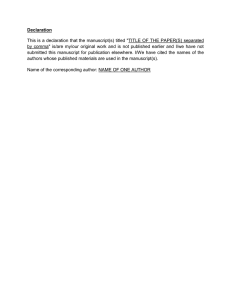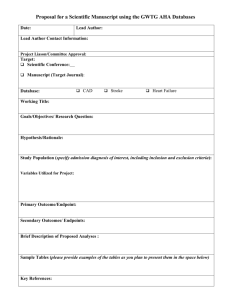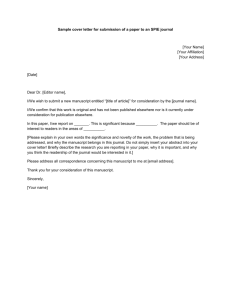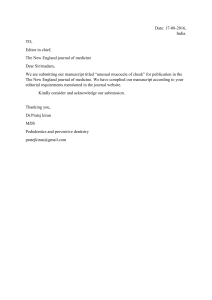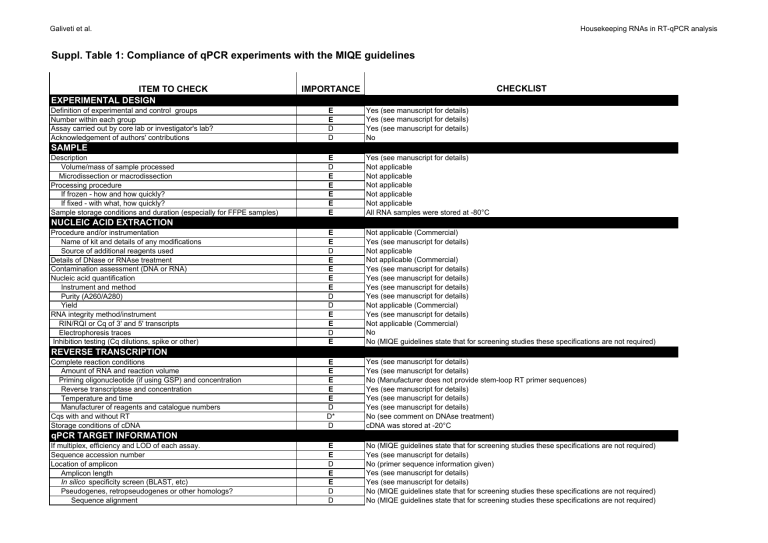
Galiveti et al. Housekeeping RNAs in RT-qPCR analysis Suppl. Table 1: Compliance of qPCR experiments with the MIQE guidelines ITEM TO CHECK EXPERIMENTAL DESIGN Definition of experimental and control groups Number within each group Assay carried out by core lab or investigator's lab? Acknowledgement of authors' contributions CHECKLIST IMPORTANCE E E D D Yes (see manuscript for details) Yes (see manuscript for details) Yes (see manuscript for details) No E D E E E E E Yes (see manuscript for details) Not applicable Not applicable Not applicable Not applicable Not applicable All RNA samples were stored at -80°C E E D E E E E D D E E D E Not applicable (Commercial) Yes (see manuscript for details) Not applicable Not applicable (Commercial) Yes (see manuscript for details) Yes (see manuscript for details) Yes (see manuscript for details) Yes (see manuscript for details) Not applicable (Commercial) Yes (see manuscript for details) Not applicable (Commercial) No No (MIQE guidelines state that for screening studies these specifications are not required) E E E E E D D* D Yes (see manuscript for details) Yes (see manuscript for details) No (Manufacturer does not provide stem-loop RT primer sequences) Yes (see manuscript for details) Yes (see manuscript for details) Yes (see manuscript for details) No (see comment on DNAse treatment) cDNA was stored at -20°C E E D E E D D No (MIQE guidelines state that for screening studies these specifications are not required) Yes (see manuscript for details) No (primer sequence information given) Yes (see manuscript for details) Yes (see manuscript for details) No (MIQE guidelines state that for screening studies these specifications are not required) No (MIQE guidelines state that for screening studies these specifications are not required) SAMPLE Description Volume/mass of sample processed Microdissection or macrodissection Processing procedure If frozen - how and how quickly? If fixed - with what, how quickly? Sample storage conditions and duration (especially for FFPE samples) NUCLEIC ACID EXTRACTION Procedure and/or instrumentation Name of kit and details of any modifications Source of additional reagents used Details of DNase or RNAse treatment Contamination assessment (DNA or RNA) Nucleic acid quantification Instrument and method Purity (A260/A280) Yield RNA integrity method/instrument RIN/RQI or Cq of 3' and 5' transcripts Electrophoresis traces Inhibition testing (Cq dilutions, spike or other) REVERSE TRANSCRIPTION Complete reaction conditions Amount of RNA and reaction volume Priming oligonucleotide (if using GSP) and concentration Reverse transcriptase and concentration Temperature and time Manufacturer of reagents and catalogue numbers Cqs with and without RT Storage conditions of cDNA qPCR TARGET INFORMATION If multiplex, efficiency and LOD of each assay. Sequence accession number Location of amplicon Amplicon length In silico specificity screen (BLAST, etc) Pseudogenes, retropseudogenes or other homologs? Sequence alignment Galiveti et al. Secondary structure analysis of amplicon Location of each primer by exon or intron (if applicable) What splice variants are targeted? Housekeeping RNAs in RT-qPCR analysis D E E No (MIQE guidelines state that for screening studies these specifications are not required) Not applicable Not applicable qPCR OLIGONUCLEOTIDES Primer sequences RTPrimerDB Identification Number Probe sequences Location and identity of any modifications Manufacturer of oligonucleotides Purification method E D D** E D D Yes (see manuscript for details) Not available Not applicable Not applicable INVITROGEN No E E E E E D E D E D E Yes (see manuscript for details) Yes (see manuscript for details) Yes (see manuscript for details) Yes (see manuscript for details) Yes (see manuscript for details) Yes (see manuscript for details) Yes (see manuscript for details) Yes (see manuscript for details) Yes (see manuscript for details) Yes (see manuscript for details) Yes (see manuscript for details) D E E E E D E E E D E E No (MIQE guidelines state that for screening studies these specifications are not required) Yes (see manuscript for details) Yes (see manuscript for details) Yes (see manuscript for details) Yes (see manuscript for details) No (MIQE guidelines state that for screening studies these specifications are not required) Yes (see manuscript for details) Yes (see manuscript for details) No (MIQE guidelines state that for screening studies these specifications are not required) No (MIQE guidelines state that for screening studies these specifications are not required) Yes (see manuscript for details) Not applicable E E E E E E D E E D D E E D Yes (see manuscript for details) Yes (see manuscript for details) Yes (see manuscript for details) Yes (see manuscript for details) Yes (see manuscript for details) Yes (see manuscript for details) Yes (see manuscript for details) Yes (see manuscript for details) Yes (see manuscript for details) Yes (see manuscript for details) No No No No qPCR PROTOCOL Complete reaction conditions Reaction volume and amount of cDNA/DNA Primer, (probe), Mg++ and dNTP concentrations Polymerase identity and concentration Buffer/kit identity and manufacturer Exact chemical constitution of the buffer Additives (SYBR Green I, DMSO, etc.) Manufacturer of plates/tubes and catalog number Complete thermocycling parameters Reaction setup (manual/robotic) Manufacturer of qPCR instrument qPCR VALIDATION Evidence of optimisation (from gradients) Specificity (gel, sequence, melt, or digest) For SYBR Green I, Cq of the NTC Standard curves with slope and y-intercept PCR efficiency calculated from slope Confidence interval for PCR efficiency or standard error r2 of standard curve Linear dynamic range Cq variation at lower limit Confidence intervals throughout range Evidence for limit of detection If multiplex, efficiency and LOD of each assay. DATA ANALYSIS qPCR analysis program (source, version) Cq method determination Outlier identification and disposition Results of NTCs Justification of number and choice of reference genes Description of normalisation method Number and concordance of biological replicates Number and stage (RT or qPCR) of technical replicates Repeatability (intra-assay variation) Reproducibility (inter-assay variation, %CV) Power analysis Statistical methods for result significance Software (source, version) Cq or raw data submission using RDML

